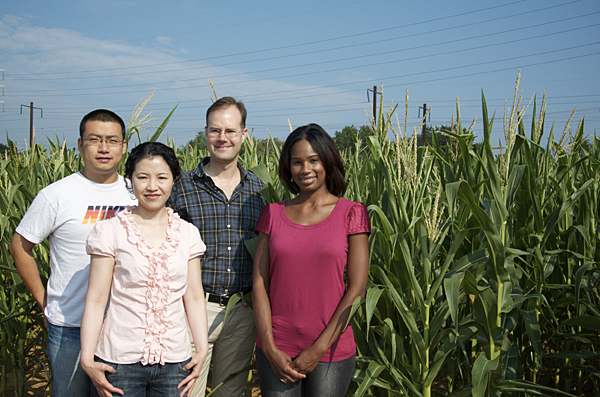
Corn mutation research
UD's Meyers receives NSF grant to study genetic impact of corn mutation
2:15 p.m., July 19, 2011--In an attempt to understand the genetic impact of a mutation in corn that turns the crop orange and stunts growth, researchers from the University of Delaware and Penn State University have received a $1.2 million grant from the National Science Foundation (NSF).
Leading the UD team is Blake Meyers, Edward F. and Elizabeth Goodman Rosenberg Professor and chair of the Department of Plant and Soil Sciences in the College of Agriculture and Natural Resources.
Research Stories
Chronic wounds
Prof. Heck's legacy
The researchers are studying a mutation known as unstable factor for orange1, or Ufo1, which not only impacts the color of the corn, turning the ears from the standard yellow to an orange hue, but has more severe impacts ranging from stunted growth to “whiplash,” a growth defect in which the corn stalk is bent backwards towards the ground.
One important aim of the project is the basic research to understand how gene silencing functions and how it can impact different cellular pathways. This mutant is of interest because it has an “epigenetic” effect on other genes, meaning that Ufo1 produces inherited states in other genes that are caused not by altered nucleotides in the DNA, but by reversible modifications of the DNA.
The research on Ufo1 is being conducted on two fronts, with Surinder Chopra, associate professor of maize genetics at Penn State, working to identify the specific gene that is the Ufo1 mutation and Meyers trying to understand the genetic and genomic impacts of that mutation.
“Basically one gene is altering the expression of many other genes through some sort of epigenetic modification," Meyers said. “I’m trying to understand, in a global genomic context, what is the impact of this mutation.”
Meyers said he hopes for a happy convergence of the projects, with Chopra pinpointing the gene and Meyers identifying all of the genes or regions of the genome that are showing epigenetic alterations.
“Then we’d like to connect those back to the phenotypic differences that we observe in this mutant," Meyers said. “There are lots of different effects that are a consequence of this mutation -- it’s not just color -- and we’d like to understand which genes are causing those phenotypic differences and why those genes are the subject of regulation by this Ufo1 gene.”
Once they discover the mutant gene and its consequences in the corn, the researchers may be able to compare how the mutation affects corn with how similar mutations affect other types of plants.
Meyers gave a hypothetical example, saying that if the researchers found how gene X functions in a certain plant, like Arabidopsis, a flowering plant related to mustard, and they discovered a mutation of that same gene X in corn, they could gain insight into how similarly or differently the two species are impacted by the same mutation.
“If you knock out gene X in Arabidopsis, you might observe no visible difference but maybe a molecular difference, so maybe it impacts certain classes of small RNAs," Meyers said. "You knock out exactly the same gene in maize, maybe you get a dramatic phenotypic difference -- maybe the plant is stunted, maybe it’s sterile, maybe the cob color is different.”
Meyers said the researchers would like to understand why these differences exist, “because it must have something to do with the way some of the genes are regulated.”
The researchers then would be able to provide more insights into epigenetic regulation. “Normal development requires these epigenetic changes," he said, "so we’d like to understand, ‘well, what happens when you perturb these normal mechanisms?’”
Eventually, this research could potentially lead to the ability to regulate certain genes, meaning that the researchers would be able to turn on or turn off certain traits of a plant species without having to mutate the gene.
“It might provide us new ways to switch on and off different traits in a way that’s stably inherited but not necessarily always on or always off. It gives us a new tool in our toolbox for altering gene activity and then potentially different plant phenotypes,” Meyers said.
For instance, if the researchers needed to breed corn that is drought resistant, they could potentially turn on the drought resistant gene in areas in which corn needs drought resistance, and turn it off in those areas in which it doesn't. They could find a way to make these genes inherited through a stable means, turning the genes on or off for the next generation as their surroundings dictate.
“You might want to only turn them on in the case that you think that the next generation might need them because there might also be some fitness ‘cost’ to having them on, and you wouldn’t want to incur that cost,” Meyers said.
The outcome of this scientific research that could lead to what seems like cinematic science fiction is all down the line. For now, the researchers are concentrating solely on discovering the gene causing the Ufo1 mutation, and then finding out the genetic and genomic impacts of that mutation.
Article by Adam Thomas
Photo by Danielle Quigley








